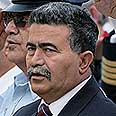
Peretz freezes construction plans in Maskiot
Following rare international criticism, defense minister withdraws approval to construct 30 housing units in northern Jordan valley settlement for families evacuated from Gush Katif. Evacuees in response: Peretz making political profit on our expense
According to the report, Peretz's representative told the regional council that the construction plans would be frozen until a new decision is made on the matter.
About three weeks ago, the defense minister approved the construction of 30 housing units for families evacuated from Gush Katif. Work was scheduled to begin in the upcoming days.
Dubi Tal, head of the Jordan Valley Regional Council, reportedly said that it appeared the Labor Party primary elections were more important than settling the Jordan Valley. He added that he would appeal to Prime Minister Ehud Olmert, who approved the settlement construction.
The decision sparked harsh responses also among the potential settlers.
Lior Kalifa, head of the Gush Katif settlers committee, said that "the defense minister is going everything in order to thwart the rehabilitation of Gush Katif evacuees and their return to a normal life.
"It should be mentioned that former Prime Minister Ariel Sharon explicitly promised to build the neighborhood in Maskiot, and the decision to freeze it now is a destructive move derived from cynical political considerations. The committee calls on the prime minister to prevent the defense minister from making a political profit at the expense of the people uprooted from Gush Katif."
'Decision to prolong evacuees' suffering'
Sources at the National Union-National Religious Party faction said in response, "It appears that everything has already been said about Defense Minister Amir Peretz's quality of judgment and about the seriousness of his decisions."
According to the sources, the decision to freeze the construction in Maskiot will prolong the suffering of Gush Katif evacuees in spite of the prime minister's promise to solve their problems.
Knesset Member Uri Ariel (NU-NRP), head of the lobby for Gush Katif evacuees, claimed that "the defense minister is spitting in the face of Gush Katif evacuees instead of helping them with their problems.
"Only yesterday we sat with the prime minister, who promised to advance and help the evacuees. The nation has had enough of Peretz as defense minister. He has no legitimacy to make miserable decisions with a political gain," he charged.
The Left also slammed Peretz over the decision. Peace Now Secretary-General Yariv Oppenheimer said that the decision "is a right decision which serves the State of Israel. However, it is regrettable that the government is not forming a clear policy of freezing the construction in the territories."
Israel's plan to construct the new settlement drew rare criticism from the United States and the European Union last month.
The community was first founded as a "Nahal" military outpost and is currently supposed to absorb 30 families who were evacuated from Gaza last summer and to be turned into a normal civilian community.
Gonzalo R. Gallegos, a US State Department spokesman, said in December that If Israel goes ahead with the plan it would violate its obligations under the Road Map for peace.
"The US calls on Israel to meet its Road Map obligations and avoid taking steps that could be viewed as predetermining the outcome of future negotiations," he said.
Finland, which is known as a harsh critic of the settlement enterprise, added in the statement that "such unilateral actions are also illegal under international law and threaten to render the two-state solution physically impossible to implement.”
"This development would also mean the relocation of some of the Gaza settlers in the West Bank, something that the EU stated is not acceptable when it gave its support to the Gaza disengagement,” the EU said.
Ynetnews and AP contributed to the report










